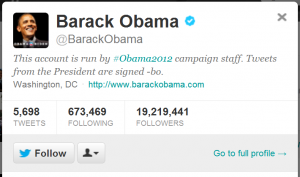 Recent reports have shone a light on a website that shows what percentage of someone’s Twitter followers are “fake,” “inactive” and “good.”
Recent reports have shone a light on a website that shows what percentage of someone’s Twitter followers are “fake,” “inactive” and “good.”
If the Fake Follower Check site is accurate, some of the biggest Twitter users, including President Obama, Lady GaGa and Justin Bieber, have thousands or even millions of “followers” who aren’t real people.
Looking further into this phenomenon, it appears there is a massive lies-for-sale industry made up of services that either offer tools to help people lie, or tell lies directly on behalf of their customers.
How much does it cost to fake popularity? On the cheap side, you can buy 1,000 Twitter followers for $14 on a site called InterTwitter; 5,000 followers cost $43; 100,000 cost $487.
Followers are even cheaper on FanMeNow, where you can buy 1,000 followers for $10 — or 1 million for $1,350.
Higher-end sites like Buy Active Fans promise not just followers, but engaged followers. But those higher quality followers will cost you $460 for 100,000.
Some of these businesses will also sell you followers and fans on Facebook, YouTube, Instagram and other sites.
The fake Twitter followers industry is just the tip of the iceberg. In fact, a huge fake-popularity industry takes many forms. An application called One million Clicks, billed as a Web traffic simulator, will make it look like your site is getting outstanding traffic.
For $5, you can even have a fake girlfriend on Facebook. A site called GirlfriendHire lets you browse and pick a phony companion — and that person will actually provide the service of posting on your wall, etc., so your family and friends think you really are dating someone.
Even Google Voice will lie for you. When you “block” a number on the service, anyone who calls from that number will get a perfectly convincing “this number is no longer in service” message.
If you want to pretend to be someone you’re not while making a real phone call, there’s an app for that. Fake Voice will mask your voice, making it sound like someone else’s. A Windows application also called Fake Voice does something similar.
There’s also an interesting subcategory of smartphone apps that spoof your GPS location, making it look like you’re somewhere you’re not. These include Fake GPS Location on Android.
Some software lets you pump pre-recorded video into webcam software to make it seem like you’re someone or somewhere you’re really not. PerfectFakeWebcam and Fake Webcam are two of the more popular options.
A download called Pwn Mail spoofs the sender address for outgoing email. That means you can send email, but the recipient thinks it came from whomever you specified.
Is all this computer-aided lying unethical? Probably. But the important thing is that people and organisations know these products and services exist.





